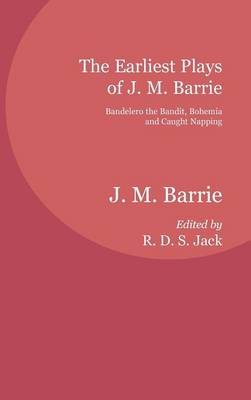There are four reasons for producing this modern edition of Barrie's earliest plays - 'Bandelero the Bandit', Bohemia and 'Caught Napping'. The first is canonical. Neither of the first two has ever been published while only two copies of 'Caught Napping' can be traced and these date from the year of its composition in 1883. The second is biographical. After being heralded as a genius in his own day simplistic Freudian links between Barrie and his most famous creation, Peter Pan threatened to turn him into a one-play oddity or, more generally, a naive writer fleeing sentimentally from serious themes and ideas. Although these views have now been critically rejected and Barrie restored to his former central place in the history of British drama, his childhood and youth remain an especially important area of biographical enquiry. While psychological analyses of these early days before Barrie became a London playwright abound there is little by way of literary comment and no printed texts to consult. These are the gaps which this volume seeks to fill. 'Bandelero', the one-act play he wrote in 1877, while still a pupil at Dumfries Academy, is especially important.
The three acts of Bohemia follow and were composed in Edinburgh four years later when Barrie was studying at Edinburgh University. 'Caught Napping' belongs to yet another stage of development and introduces a third geographical setting. He is now a full time journalist on The Nottingham Journal and so it is unsurprising that the short farce is published in the Saturday Supplement to that paper. The third reason is literary. The critical introductions to these plays demonstrate the many ways in which their form, theatrical techniques and themes anticipate Barrie's later practice. For example, the frequent critical claim that 'Ibsen's Ghost' in 1891 is the first of Barrie's plays to use burlesque conventions implies ignorance of 'Bandelero's heavy reliance on the same conventions ten years earlier. His heavy technical reliance on the visual and aural powers of the theatre is witnessed in all three. Thematically, while studies of women as at once more powerful and more knowledgeable than men will become a leitmotif in Barrie's work, it is usually traced back, at the earliest, to 1891 and Walker, London.
Yet clearer models, in Bohemia's Vanity and Jenny in 'Caught Napping' pre-date that work. The fourth motivation is editorial and is by way of a modest proposal. Now that Barrie has once more 'arrived,' is it not time that fully annotated modern acting editions, reflecting the many changes he made in study and in theatre, might now be offered? The simple editorial task afforded by the single witnesses to each of Barrie's earliest plays may not in itself mirror the complexities of that task but it does, literally, 'open up' the challenge.
- ISBN13 9781846220449
- Publish Date 31 October 2013
- Publish Status Out of Print
- Out of Print 11 August 2021
- Publish Country GB
- Publisher Zeticula Ltd
- Imprint Humming Earth
- Edition Annotated edition
- Format Hardcover
- Pages 156
- Language English
